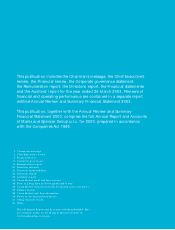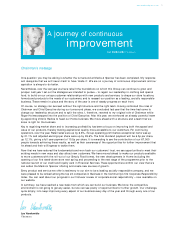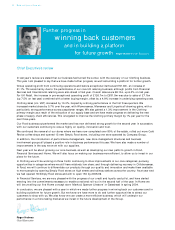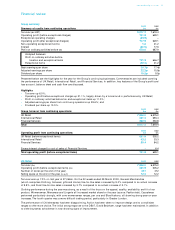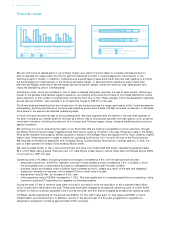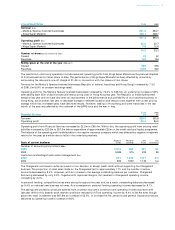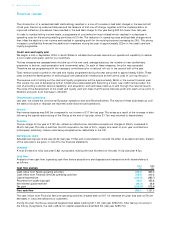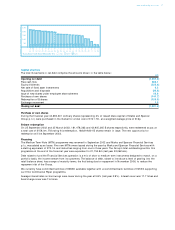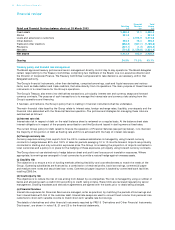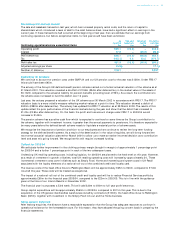Marks and Spencer 2003 Annual Report Download - page 12
Download and view the complete annual report
Please find page 12 of the 2003 Marks and Spencer annual report below. You can navigate through the pages in the report by either clicking on the pages listed below, or by using the keyword search tool below to find specific information within the annual report.
The Board is committed to high standards of corporate governance and has applied the Combined Code principles as
shown below. It has reviewed the recommendations of the Higgs Review on non-executive directors and the Smith Report
on audit committees, both published in January 2003, which will result in a revised Code. In anticipation of such revision,
the Board is putting in place procedures to enable it to report future compliance.
Directors
As at 29 March 2003, the Board comprised 12 directors, being the Chairman, Chief Executive, five executive and five
non-executive directors.
Luc Vandevelde headed the Board as Chairman and Chief Executive until 1 September 2002 when Roger Holmes was
appointed Chief Executive and Luc reverted to his original position as Chairman. Since 1 January 2003, he has fulfilled
his role as Chairman on a part-time basis, spending 60% of his time on Group business.
Key features of the corporate governance structure are:
•As Chairman, Luc Vandevelde remains closely involved with the development of corporate strategy and is also
Chairman of the Board of Marks and Spencer Financial Services and of the Board’s corporate social responsibility
committee. He is also a member of the nomination committee which is chaired by our Senior Independent Director,
Brian Baldock.
•Roger Holmes exercises his delegated powers as Chief Executive through a newly formed Group Operating Committee
comprising the executive directors and members of senior management. It meets fortnightly in retail and
finance/operating forums.
•The non-executive directors provide a wide range of skills and experience to the Group. They bring an independent
judgement on issues of strategy, performance, risk and people through their membership of the Board and its
committees. All non-executive directors are considered independent.
•A new Corporate Governance Group has been formed to advise the Chairman and the Board, led by the Group
Secretary, Graham Oakley. It comprises heads of secretariat, legal, audit and risk, insurance, pensions and senior
remuneration and senior succession.
A full list of the directors, along with their biographies and the Board committees on which they sit, is given on page 19
of the Annual Review.
All directors have access to the advice and services of the Group Secretary, who ensures that the Board, which meets
formally eight times per year, receives appropriate and timely information for its decision-making, that Board procedures
are followed and that statutory and regulatory requirements are met. The Secretary also assists the Chairman in ensuring
that all directors are properly briefed on issues arising at Board meetings. Directors receive appropriate induction training
when they join the Group and coaching to develop individual skills as required.
There is an established procedure whereby any director, wishing to do so in the furtherance of his or her duties, may take
independent professional advice at the Group’s expense.
Under the Company’s Articles of Association, one-third of the Board retires by rotation each year and all directors are
required to offer themselves for re-election at least every three years.
Principal Board committees
The Board has a formal schedule of matters reserved to itself. The Board has delegated certain responsibilities to Board
committees, which operate within clearly defined terms of reference, reporting regularly to the Board, and include:
Audit Committee: assists the Board in fulfilling its overview responsibilities, primarily reviewing the reporting of financial
and non-financial information to shareholders, the systems of internal control and risk management, and the audit process.
It comprises five non-executive directors, is chaired by Kevin Lomax and meets formally three times per year increasing to
four times during 2003. The external auditors and the Chief Internal Auditor attend all meetings.
The Financial Services division has its own Audit and Compliance Committee, which includes independent non-executive
directors, and which meets three times per year and reports regularly to the Financial Services Board and the Audit
Committee.
The Audit Committee also keeps under review the independence and objectivity of the external auditors. The Committee
reviews the nature and amount of non-audit work undertaken by PricewaterhouseCoopers LLP (‘PwC’) each year to satisfy
itself that there is no impact on their independence. In some cases, the nature of the advice may make it more timely
and cost-effective to select PwC who already have a good understanding of the Group. PwC may also be appointed for
consultancy work, but only after rigorous checks, including competitive tender, to confirm they are the best provider. PwC
are also subject to professional standards which safeguard the integrity of the auditing role they perform on behalf of our
shareholders. Details of this year’s fees are given in note 3 on page 32. A new engagement and fee approvals process was
put in place during the year requiring prior Audit Committee approval for some engagements and excluding others.
Corporate governance
10 Marks and Spencer Gro up p.l.c.


